Here it is, the ultimate guide to flexible fat loss! How to lose weight sustainably by eating the foods you love and fix your relationship with food too.
Seriously!
Forming a rock-solid relationship with food isn’t easy.
But nothing worth having ever is.
When you hook it up though, it looks like this:
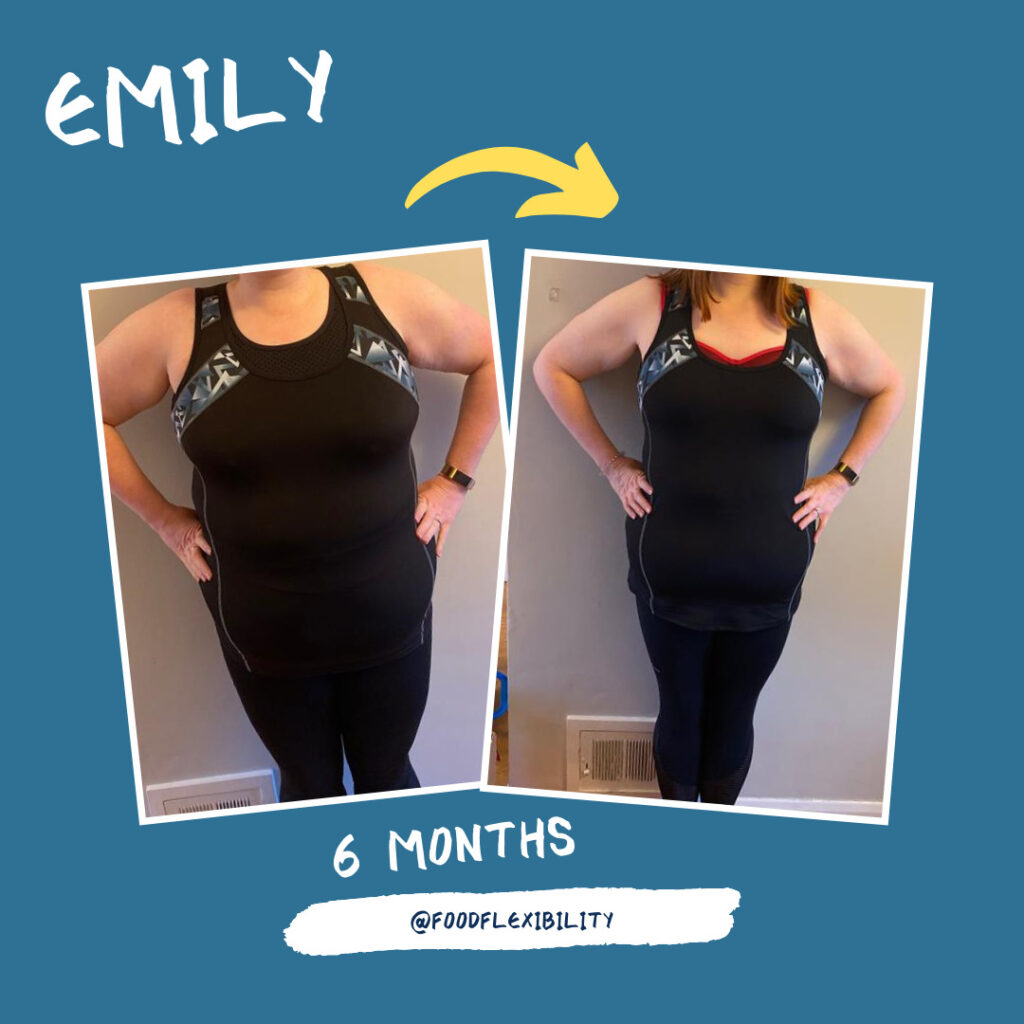
Emily has a busy and stressful job, does not spend hours in the gym, is the matriarch of her family and has dealt with a ton of stress in the past year.
*Yes, Emily’s transformation is amazing, but the most impressive part is that she’s sustained that change for the past 2 years despite some pretty trying personal circumstances.
The key to her success?
Life will always throw curve balls at you so what Emily has done brilliantly is to simply get back to her nutrition as soon as possible after life de-rails things for whatever reason.
First things first…
Can you lose weight sustainably through exercise alone?
Exercise for your health, not for the ‘calorie burn’.
Having a healthy heart, being mobile, capable, and strong all enable you to be a better human being.
“But Tim, I love food! I’d much rather exercise hard so I can eat whatever I like.”
Time for some tough love I’m afraid…
You can’t out train a bad diet.
Exercise makes up a tiny fraction of the calories you burn, so trying to lose weight (sustainably) through movement alone is like running a marathon in flip flops, doable but ultimately quite slow and painful.
If exercise is helping you lose weight sustainably then crack on, but you’ll be in the minority.
Whilst technically you can out train your diet, it requires time:
- to train multiple times per day
- to nap in the afternoon, so you’re fresh for the next session
- to do your mobility (ROMWOD or yoga) so that you don’t get injured
Hands up if you’ve got three hours to dedicate to fitness, every single day.
I thought not…
Not to mention, what happens when you get injured, or life gets busy.
So, most people can’t out train a bad diet.
Don’t get me wrong, I used to try.
When I knew nothing about nutrition, I always wondered how I could be smashing out three circuit training sessions per week and running up and down sand dunes until I collapsed in pool of my own sweat most weekends but never getting any leaner.
But don’t take my word for it.
My client James plays and coaches tennis pretty much every day of the week.
His activity levels are through the roof, yet he was still struggling to lose fat.
His energy levels were all over the place too.
When we dialled in his diet this happened:
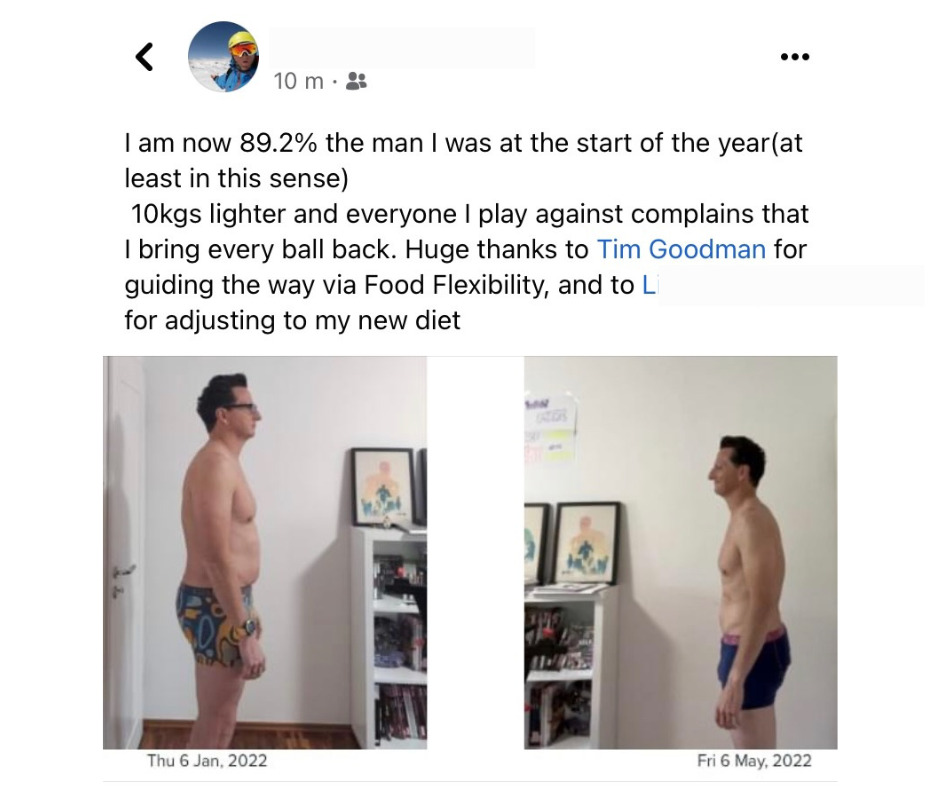
Here’s my client Karen, she was cycling at least 50km and doing 3 bootcamp sessions a week but still couldn’t lose weight sustainably until, guess what…
We dialled in the detail!
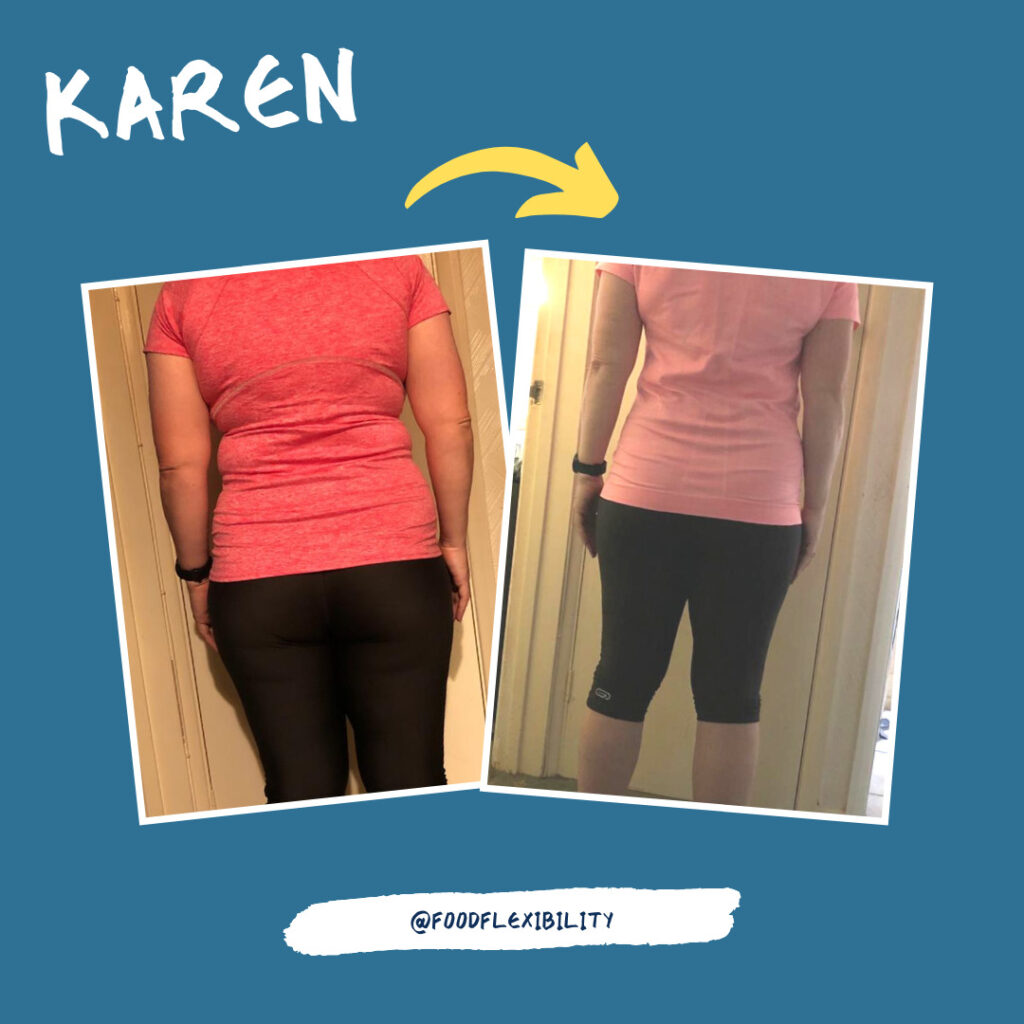
Or there’s Nick, a classic ‘weekend warrior’. Playing sport every weekend and doing multiple gym classes per week but not getting any leaner until he…
You got it!
Dialled in the detail:
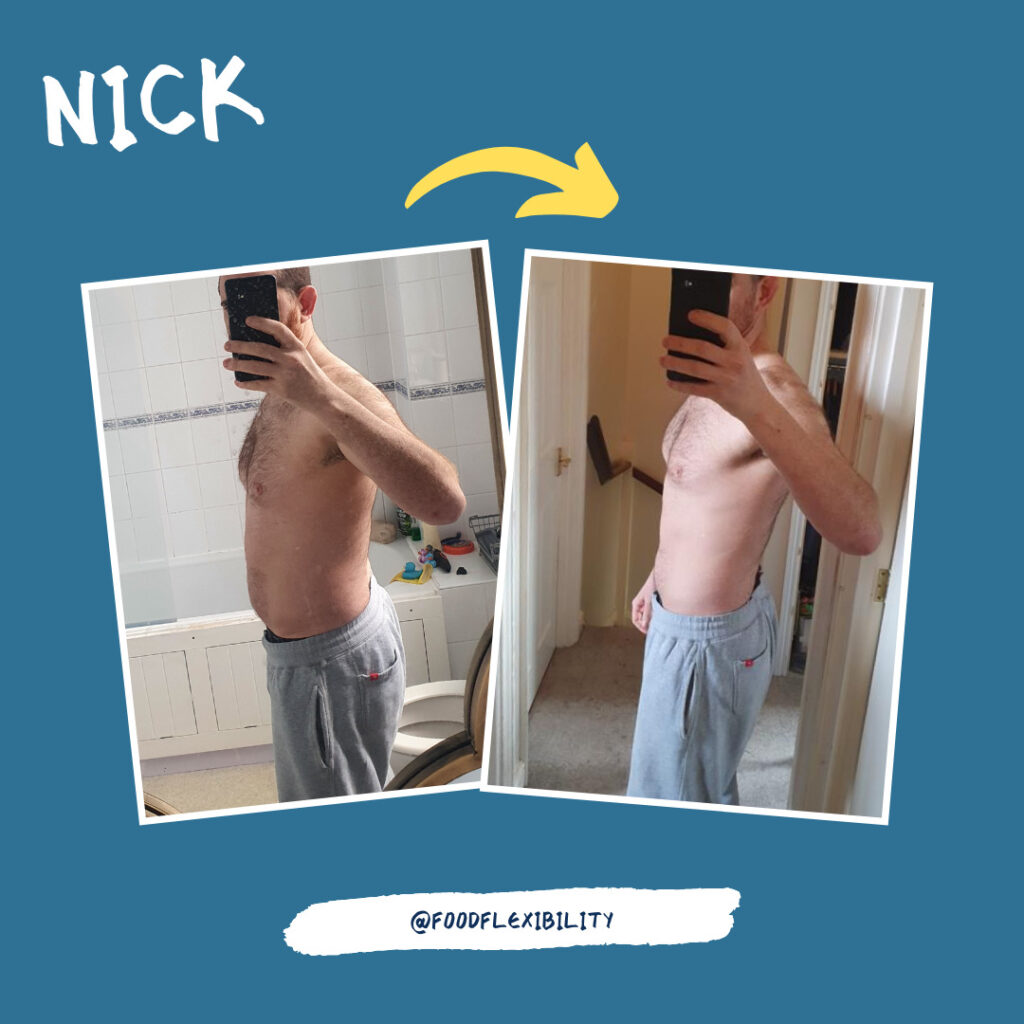
Emily, James, Karen, and Nick were all able to lose weight sustainably without giving up any of their favourite foods because they all have one thing in common.
Discipline!
If you can be disciplined, then you can lose weight sustainably just like they did.
This is not me telling you to try harder though.
Far from it!
This article will outline the exact strategies I use to help all my clients lose weight sustainably. You can see their results here.
Read on and you’ll get rock solid advice about how to make discipline so easy it doesn’t feel like you’re trying to lose weight at all.
It’s the most comprehensive free guide to losing weight sustainably you’re going to find.
- You’ll learn how to bullet proof your mindset so that motivation is never an issue again.
- Build a step-by-step plan of how to choose the right foods so that you lose fat easily and sustainably.
- Best of all, you’ll learn how a weight loss diet can (and should) incorporate the foods you enjoy.
- Finally, there is an extensive FAQ section covering the most common questions I get asked about fat loss from ‘do carbs make you fat?’ to ‘what are the best exercises for fat loss?’.
If you’re as fed up with fad diets, slimming clubs, and weight loss ‘hacks’ as I am, you’re going to love it.
Don’t be tempted to skip around, I’ve chosen the order of the article carefully to ensure that you build the strongest foundation possible.
For those of you who take the time to follow this advice carefully this will be the last ‘diet’ you’ll ever need to do.
How to stop falling off the wagon when dieting
To kick things off I want you to start with a different mindset.
You can’t mess this up!
If you’ve ever ‘blown your diet’ or skipped a workout you aren’t alone.
That person you envy in the gym does it all the time.
You just don’t see it happen, who posts that on Instagram anyway!
Successful people frame things differently, they never jack it in if they mess up.
They just get back on the ‘wagon’ as soon as possible, even when they ate 3,000 calories more than they wanted or skipped training for a month.
Because the only way you truly mess up is to quit for good.
So, from now on, stop using ‘I fell off the wagon’ as an excuse.
There isn’t even a bloody wagon in the first place!
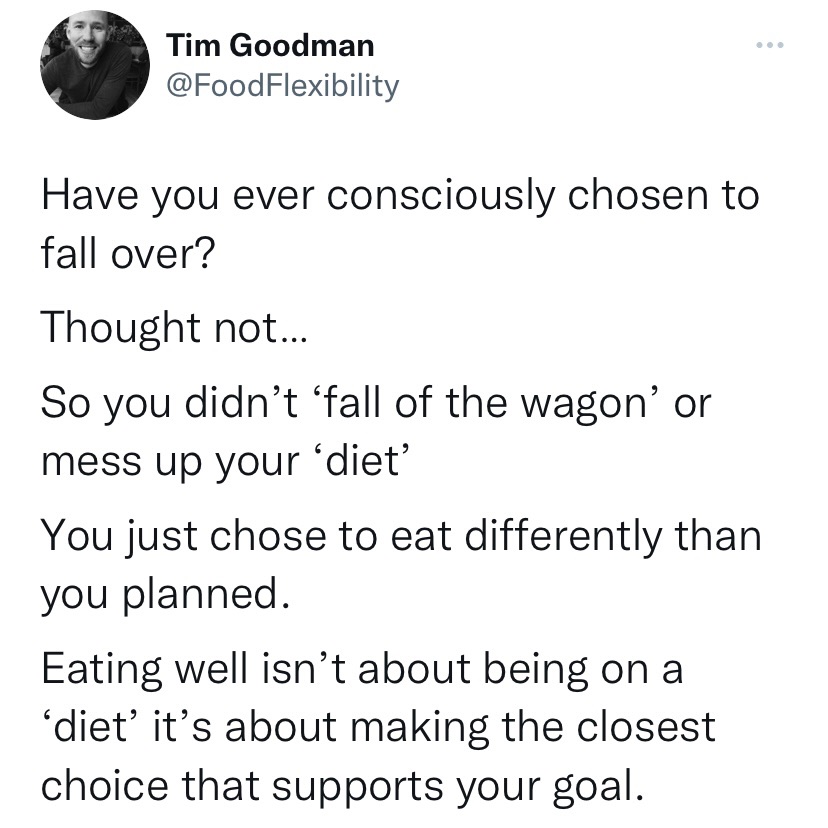
Health and fitness enrich your life so they should be enjoyable!
There’s no ‘8-week challenge’ when it comes to health because there is no finish line.
Take away the pressure to cram ‘getting healthy’ into 8 weeks right now.
Simply put…
You can’t fuck this up.
How do you get motivated for fat loss?
Here’s the secret…
Your mindset is the foundation of success when it comes to losing weight sustainably.
Mindset is the hardest part for most of you but it’s critical.
Progress will always be slower than you want it to be, and the process will be hard.
You can’t control either of those things.
What you can control is your mindset.
So long as you don’t quit, it’s just a matter of when you’ll succeed!
When you stop looking for quick fixes like the Carnivore Diet, ‘detoxes’ or drinking apple cider vinegar 🤢 you get to use your energy on discipline instead.
Because, as you’ll find out next, discipline beats motivation every single time.
How do you find motivation for weight loss?
The truth is motivation isn’t going to turn up on its own.
For example, most mornings I’ve had zero motivation to write this article, but I got started and then it became easier.
Getting back into exercise and healthy eating is just the same.
Once you make a start it gets easier.
Find the discipline to do something. Anything. No matter how small it might seem.
One you start, you feel better about doing something. Then you feel proud and that’s when you feel motivated because you want to keep experiencing that warm fuzzy feeling of achievement.
It’s a positive cycle and all you need to do to kick start fat loss is to have the discipline to take action.
When is the best time to lose weight?
You don’t need to overcomplicate this.
Don’t wait for the right time, just take the first step.
There is never going to be the perfect time to lose weight, burn fat and ‘get back on it’.
Even if you haven’t exercised in years, eat lunch from Greggs every day, are completely out of shape and can’t even do a single push up on your knees (trust me I’ve been there) you can still get started.
Stop overcomplicating things and waiting for the right time to start.
You don’t need to save up for a £2k Peloton either…
Can you go for a walk, drink some water or eat a piece of fruit alongside your Greggs pastie?
Doing something small consistently is better than doing everything erratically at the speed of light!
My own fat loss story
You might find it helpful to know that I used to struggle to lose weight sustainably too.
I’d always been the unathletic kid at school.
I loved sport and PE, but I always felt chubby and weak.
The first time I tried to bench press in the dusty, run-down gym at university as a fresh faced 18-year-old (with almost a full head of hair!), the empty bar nearly pinned me.
I was embarrassed but I asked for help, and I found a way to just keep turning up.
You know what, the more I turned up the better I got.
Having the discipline to just keep turning up eventually led to motivation and enjoyment.
Remember, you get to control discipline, but you don’t get to control motivation.
Whilst I got fitter and stronger, I didn’t lose much fat because deep down I didn’t want to change what I ate.
I figured my genetics just sucked.
But they didn’t…
It started with eating more fruit and veg, drinking more water and walking more (there’s that discipline again).
Eventually I hired Andy Morgan to coach me and that extra accountability really helped me to get to that last level of leanness.
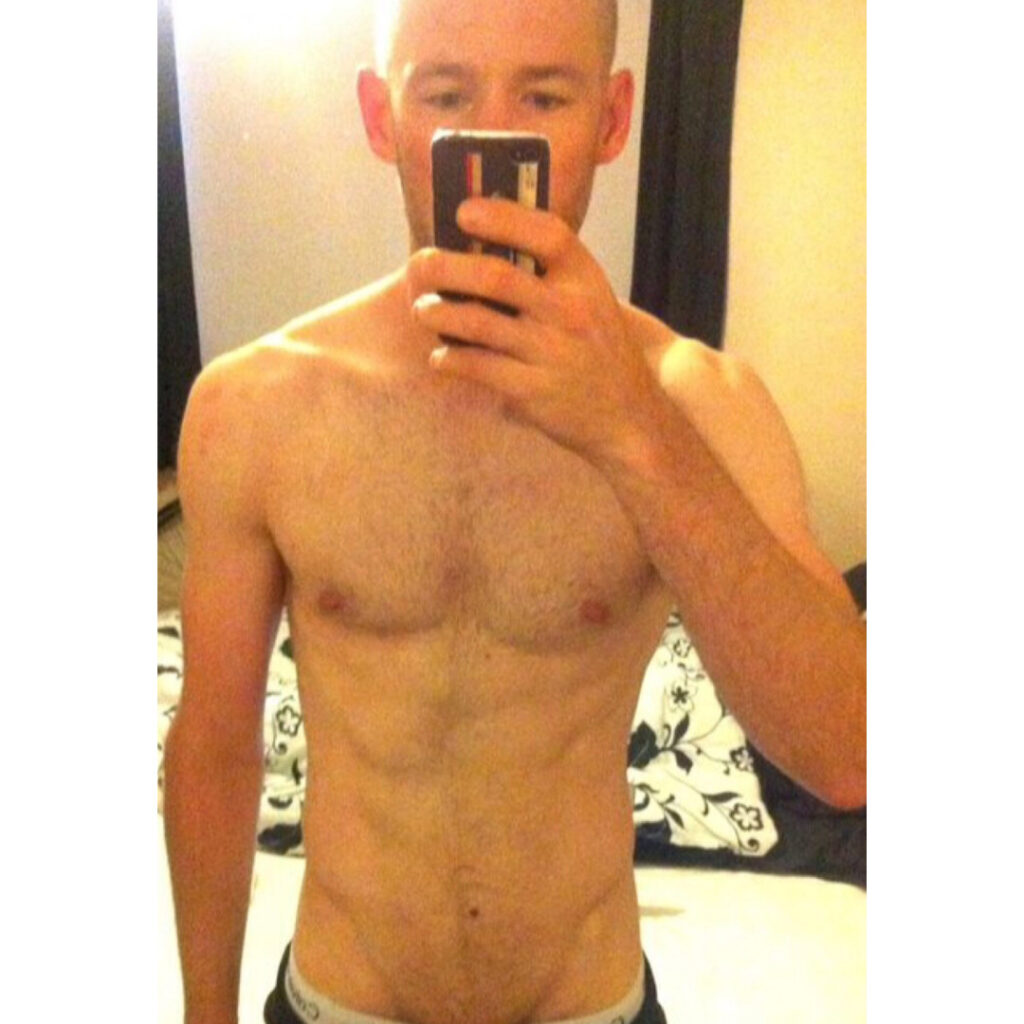
I’m not going to lie, being that lean wasn’t particularly enjoyable to maintain.
These days my focus isn’t as much on being lean as it is on being strong.
When you’re stronger, you have a bit more to ‘show’ for that leanness.
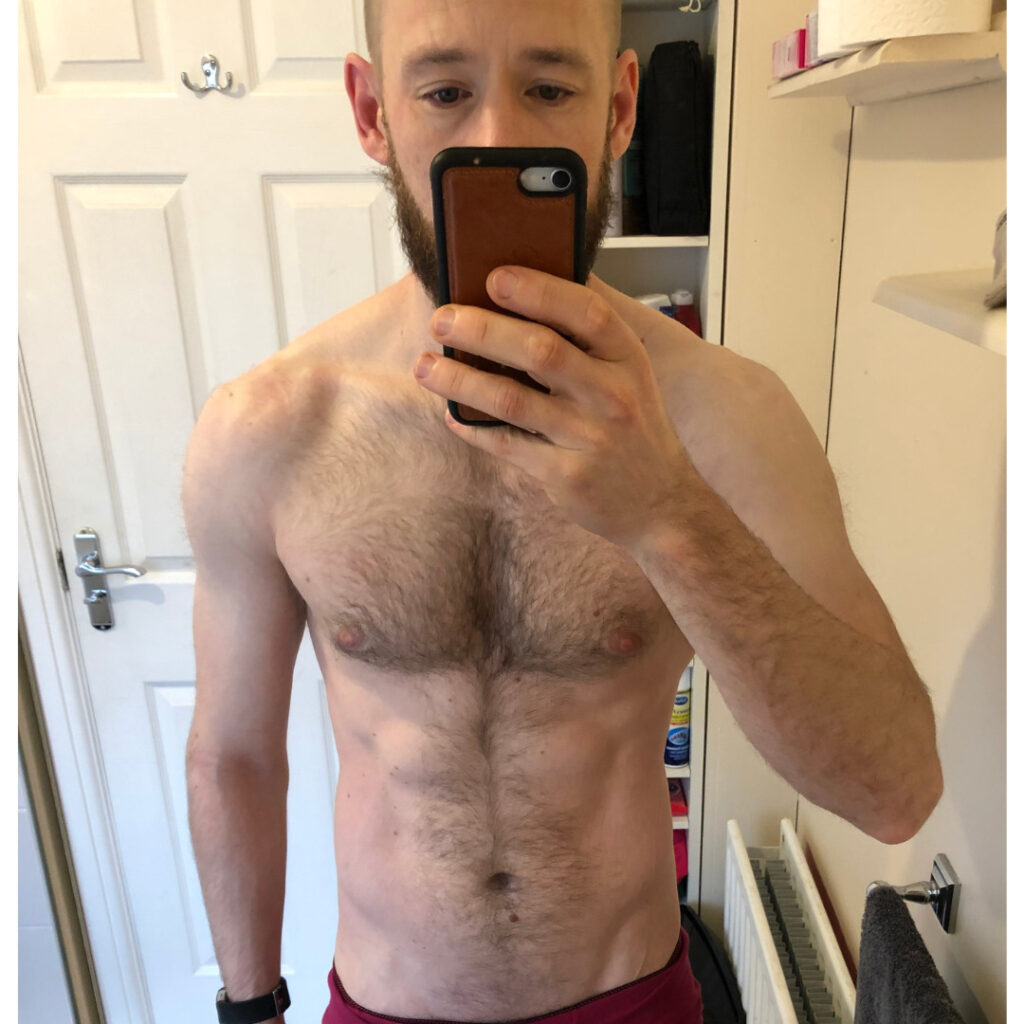
If you’re interested in eating for muscle gain, check out my lean bulk in my Instagram story highlights.
You get to do cooler stuff with that strength too:
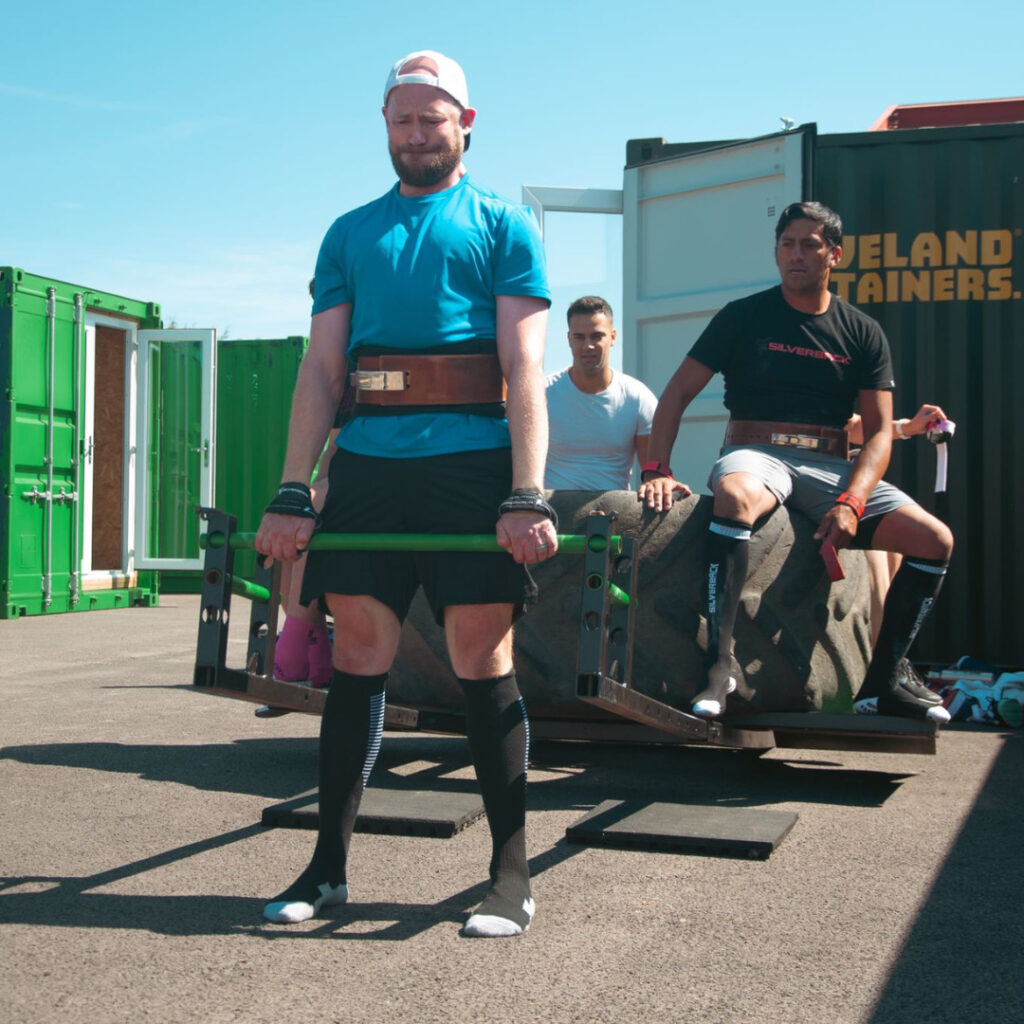
It’s ok for your goals to change too, just try to focus on one at a time and truly understand what that goal means to you.
This article is here so you don’t need to make the same mistakes with fat loss that I’ve made in the past.
Put the advice I give you into action and you’ll get lean for the rest of your life much faster than I did.
How can you lose weight sustainably by eating your favourite foods?
You might think that you need to cut out a bunch of your favourite foods to lose fat.
Here’s the thing…
You should be eating you favourite foods because the key to losing weight sustainably and successfully is to enjoy the process.
Obviously, you’ll need to make some sacrifices and have patience, but it’s a mistake to cut out everything you enjoy.
I call this Flexible Fat Loss.
Because eating foods that you enjoy should be the foundation of your diet.
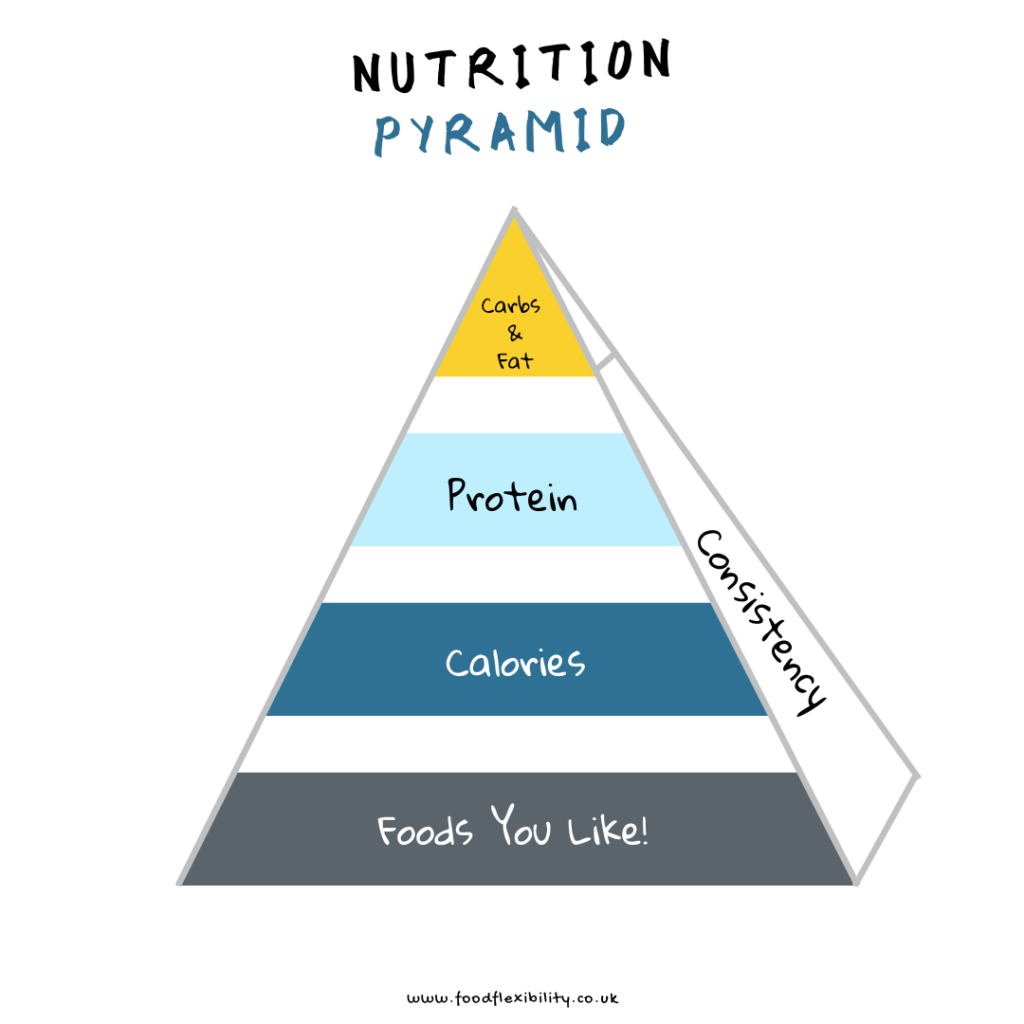
You’ll notice that consistency runs through the entire pyramid.
If you’re not consistent then nothing else matters because you need to work at fat loss long enough to make it stick.
That’s also why foods you like is the most important element, followed by calories, protein then finally carbohydrates and fats.
I’ll explain all of that in more detail shortly.
For now, remember this.
When you focus your nutrition around foods you enjoy, based around a few core principles, then losing weight sustainably looks like this:
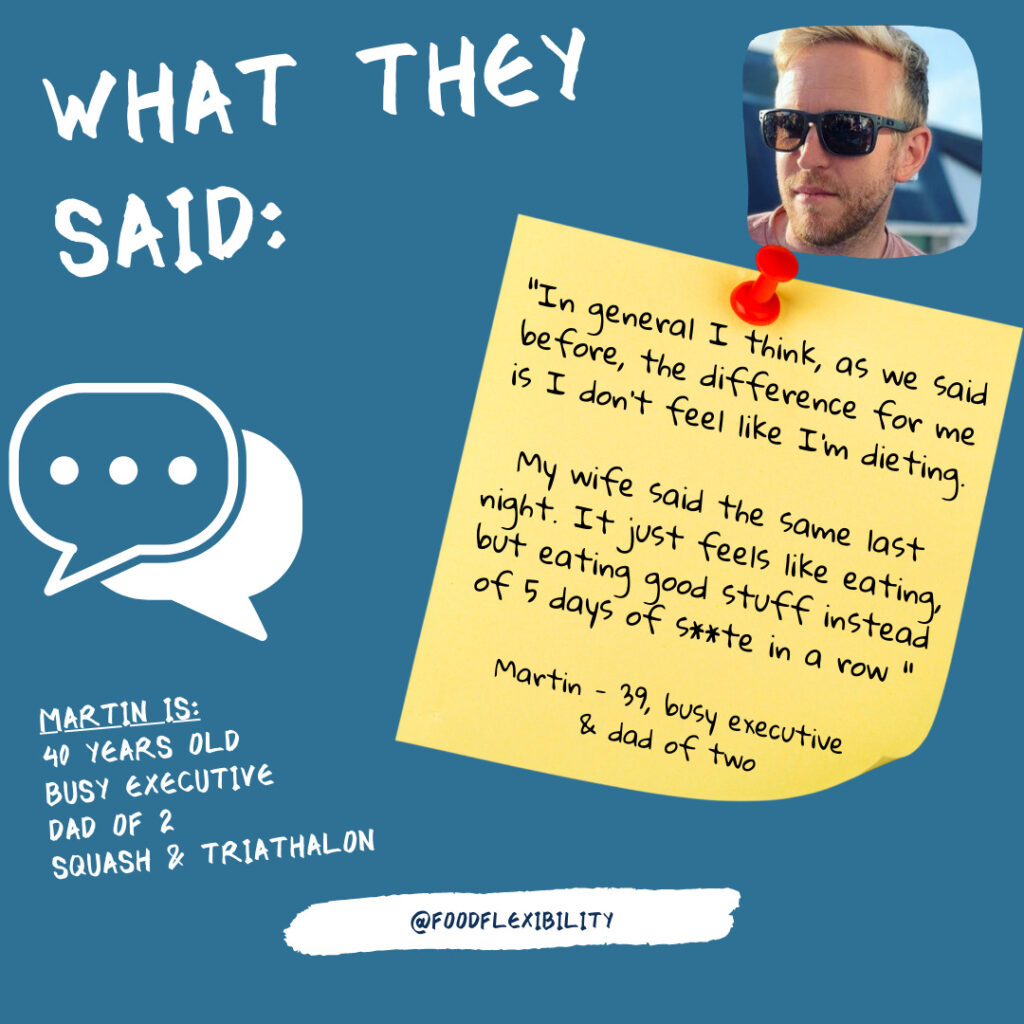
You know that it’s not a good idea to eat doughnuts all day but if they’re your favourite food then they should be in your diet.
As soon as you say no to something, you only want it more.
Fat loss takes time, so you owe it to yourself to include the foods you love.
It’s a long journey so make it an enjoyable one.
How do you make sustainable weight loss easy?
- Find a reason to change!
- Make the simplest possible change before moving on to the next one.
You might want to lose fat or look leaner and more toned for aesthetic reasons.
That’s a perfectly valid goal but my most successful clients have goals that focus on what being lean will let them do in the future.
Goals like this:
- Enjoying every second of swimming with your kids without being self-conscious
- Being around for your family, friends, or pets for as long as possible
- Getting the most out of every single day you have left on this planet
- Improving your chances of fertility
- Not needing to be helped on and off the toilet by your partner in old age
- Dancing on the tables at your grandchildren’s wedding
- Playing the sport that you love into your 40’s, 50’s, 60’s and beyond
Personally, it was only when a dietician pointed out that eating 5 portions of fruit and veg halves your risk of colorectal cancer (as horrific as it sounds!) that I sat up and took notice of my own health.
Boom!
A reason to change that punched me in the gut, lit a fire under my ass and basically changed me from the student who ate a 24-bag multipack of crisps every week, to helping people improve their health for a living.
Find a reason to change that lights a fire so big that directing discipline towards that goal is automatic.
Here’s my client Chris:
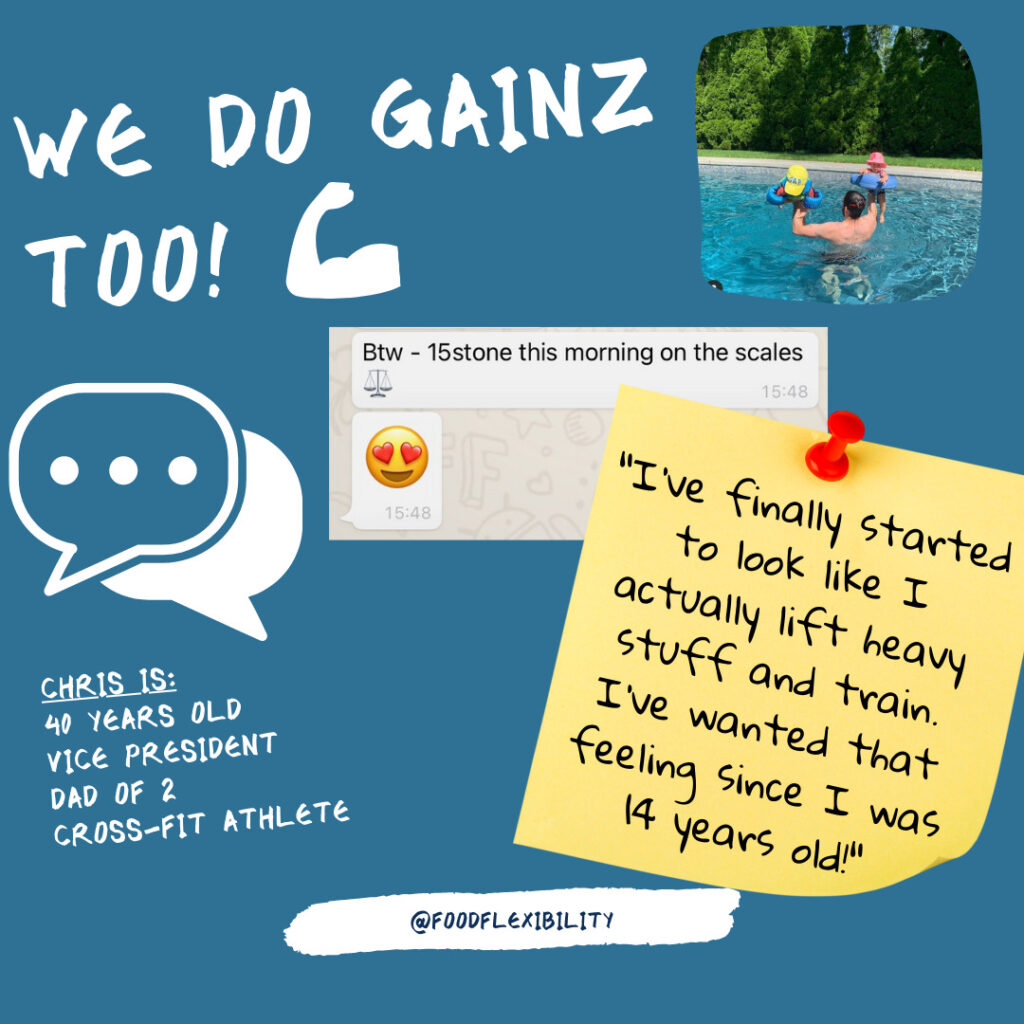
Even though he has a very busy, high powered executive job he’s found a way to make working out a priority, so he gets to have fun with his family.
You’re going to need a comprehensive reason to change because at some point you’ll need to make a sacrifice:
- Saying no to the extra drinks after work with a colleague you barely know.
- Telling your boss that you have too much work to take on another project and stay late every night this month.
- Spending 10 minutes at the weekend to plan out a few healthy meals for the week.
- Heading out for a 15 minute walk each day rather than scrolling Instagram or watching Netflix.
- Doing your mobility whilst you play with your child on the floor after work rather than sitting on the sofa scrolling on your phone.
Getting lean is the hard bit, staying lean is much easier.
Keep that in mind.
Just like you need to rein in spending when saving for the deposit on a house, you always need to make compromises for things worth having.
Those compromises don’t need to be based around restriction though.
You can still live your life like a normal human being:
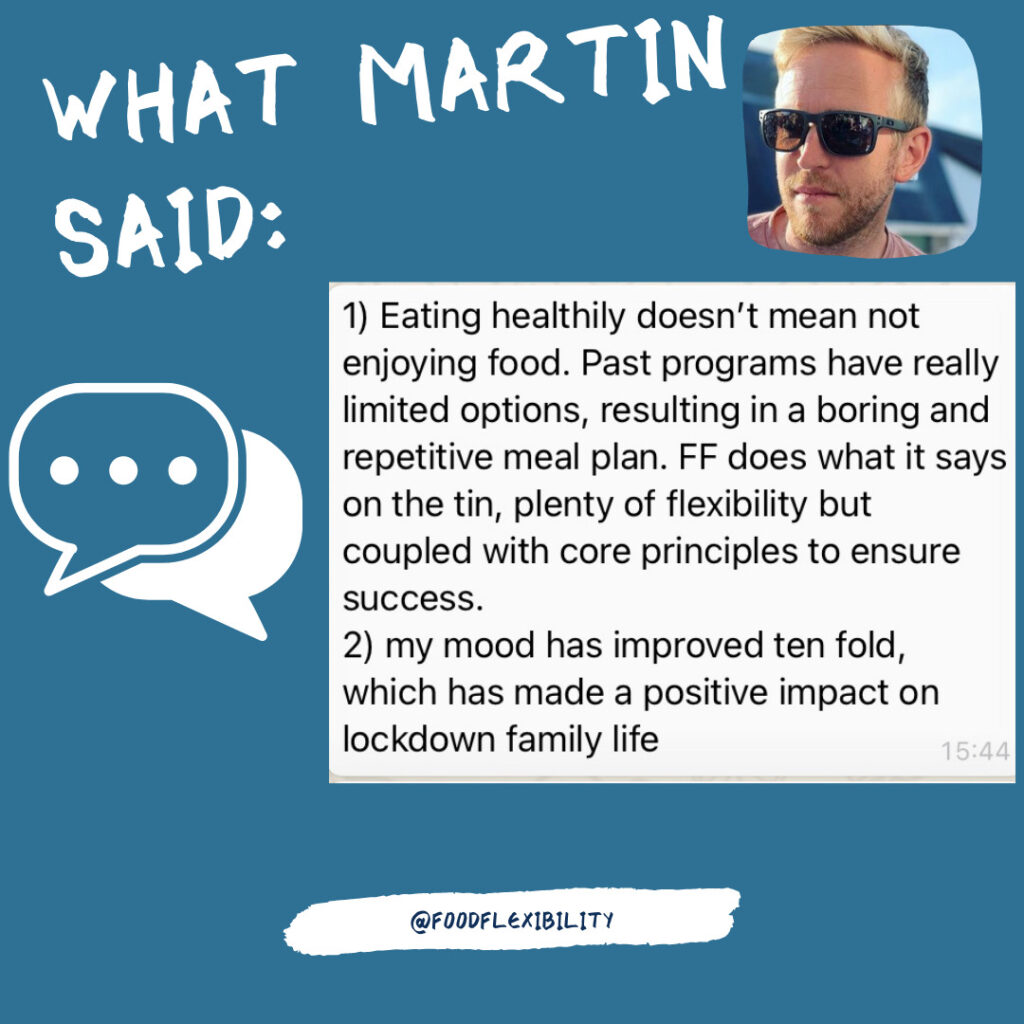
What is body fat?
So, you want to lose weight.
Why is that?
For most people it’s about looking and feeling better, improving their health or some combination of those things.
When most people say they want to lose weight they really mean they’d like to lose body fat.
That’s an important distinction.
Fat is simply excess energy stored as body tissue, it’s something you have, not something you are!
When you have something, you get to give it away.
When you are something, that never changes.
Why do I mention that?
Well, you are probably your own worst critic. It’s great to set high standards but shaming yourself or anybody else helps nobody.
Let’s reframe that mindset right now…
You’re going to repeat after me:
“I am not fat. I’ve just got excess energy that I’m ready to give away.”
Why do you store body fat?
When you take in more energy than you burn, your body saves this energy for a rainy day as fat tissue.
These fat stores would have prevented you from starving to death when humans lived in caves and had to hunt their food.
Back then storing body fat meant we didn’t starve when food was hard to come by.
Why do you overeat?
When we had to find our own food, it was often low in calories, so we evolved to eat as much as possible because we never knew where our next meal was coming from.
In most modern societies we have easy access to high calorie foods and don’t move around a lot, so we need to be more conscious of our food choices.
You might feel bad about your urges to overeat but remember this…
Given half a chance, that cave dwelling human inside all of us will eat everything that isn’t nailed down:
Are weight gain and fat gain the same thing?
Not necessarily.
Whilst bodyfat influences your weight so does temporary water storage, temporary energy storage and undigested food in your system.
Your weight is affected by:
- What you ate
- When you last went to the toilet
- What you drank (or didn’t drink)
- Stress
- Hormones (and menstrual cycle if you have one)
- Workout intensity
- Salt
- Sleep
- Plus a million and one other things
Here’s my performance client Teri looking leaner (because she lost body fat) despite the fact she is 1.4kg heavier:
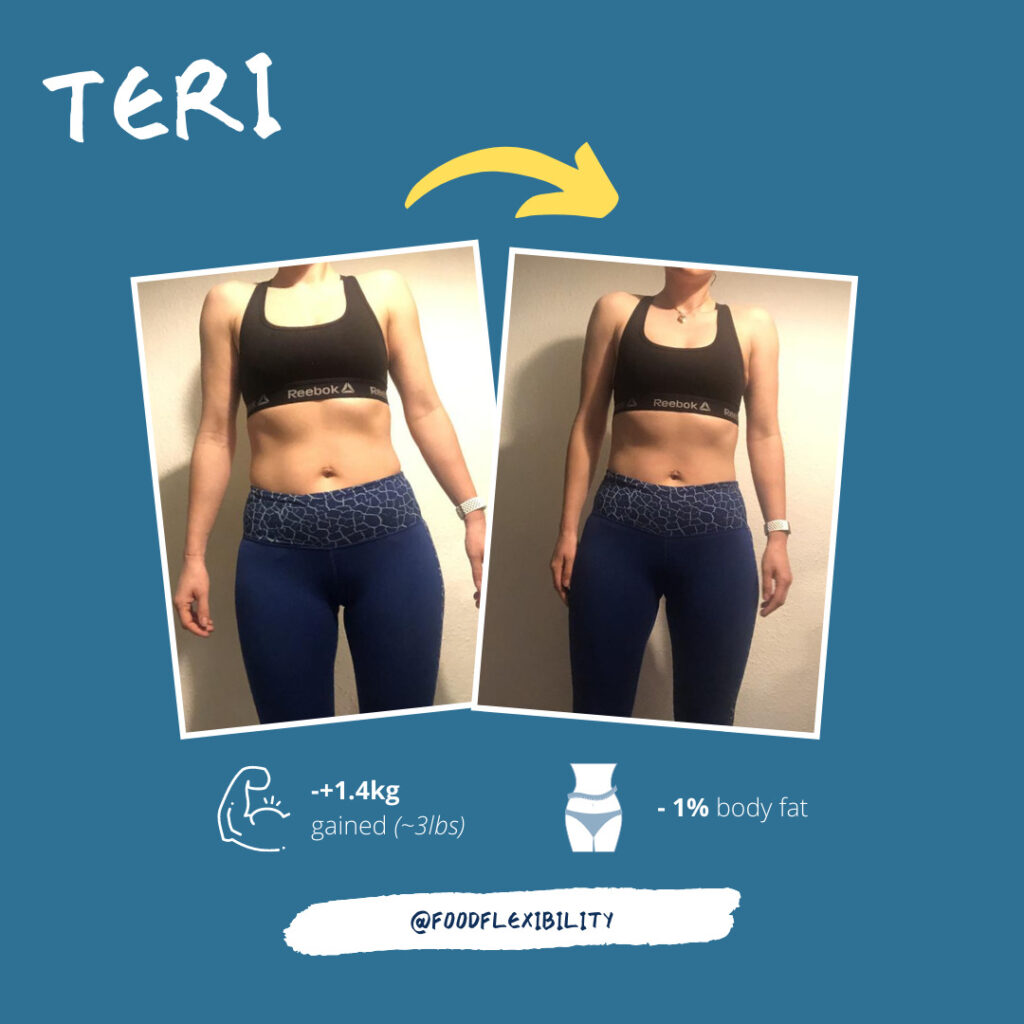
Unless you are a professional boxer or compete in a sport with a weight category, it doesn’t matter what you weigh.
Put another way, if you chopped off an arm, you’d lose weight.
I’m guessing you wouldn’t be happy with that compromise though.
How do you lose fat?
For fat loss to happen you need to consume less energy (from food and drink) than you burn.
Food gives you energy (provided it can be digested) and that energy is either used right away or stored.
It’s important that excess energy is stored rather than wasted because you need a constant supply of energy to stay alive.
You can think of it like this:
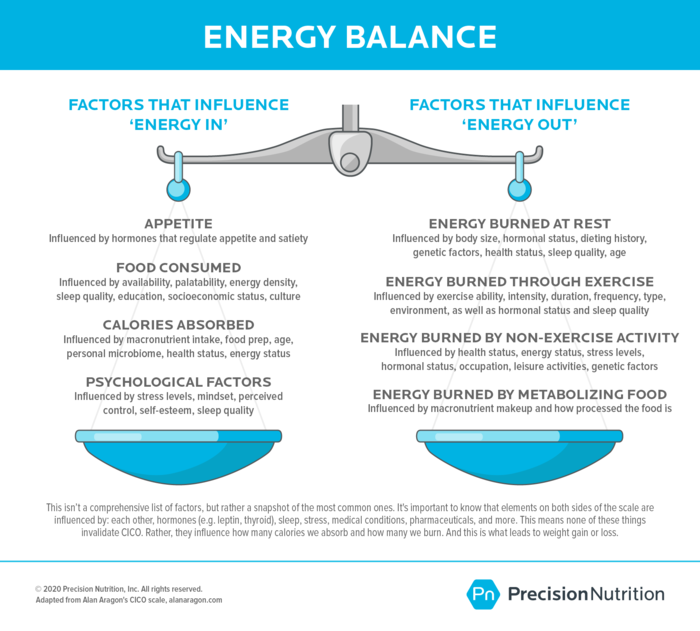
If you put more energy in than you take out, then the scales are no longer balanced.
Your body loves balance so to bring the scales level it takes the extra energy and stores it as fat.
But if you regularly consume less energy than you burn, your body is forced to ‘tap into’ those fat stores for fuel and you lose weight.
Calories matter for weight loss!
Nobody is saying that sticking to a calorie target for long enough to lose weight sustainably is easy.
It’s bloody hard work!
But it is possible, and it will work if you give it long enough.
The only way to give it long enough is to not give up!
What is a calorie and how do calories cause weight loss?
A calorie is a measure of energy.
Calories measure the energy in the food you eat as well as the energy you burn (from being alive and moving about).
When you eat food, it’s digested and turned into energy that can be used to fuel basic bodily functions as well as movement and exercise.
The energy in the food you eat, minus the energy your body uses as fuel is known as energy balance:
Energy In – Energy Out = Energy Balance = Calorie Balance
Fat loss happens when you eat fewer calories than you burn.
For example:
If your body uses 2,000 calories on a particular day but you eat 1,600 calories of food, then you have burnt more energy than you put in (400 calories more).
If you repeat that over the course of a week you will lose fat sustainably.
Here’s why…
Imagine you make a log fire, once you get it going it snaps, crackles, and kicks out heat but if you don’t keep adding logs it will go out.
When you eat fewer calories than you burn the only way to ‘add a log to the fire’ is to tap into your fat stores to access the energy your body saved up for just such a rainy day.
If you consistently eat fewer calories than you burn you will lose weight sustainably.
Do you have to count calories to lose fat?
Absolutely not!
As I’ve explained above, that doesn’t mean that they aren’t important though.
Every single method of fat loss controls calories in some way:
- Paleo (is that still a thing?)
- ‘Clean’ eating (not bars of soap)
- Keto (for those of you who don’t like bread)
- WW (you get what you pay for)
- Slimming World (see above)
- Carnivore diet (if you like constipation)
- Liver King (just… 🤬… NO!)
In some way or other they all create a calorie deficit. Usually through ‘rules’ which limit the foods you eat.
Yes, that keeps it simple but so does good old fashioned portion control:
What are the best foods for fat loss?
Don’t make the mistake of thinking you need to survive on fresh air and lettuce to lose weight sustainably.
You know that’s not going to last more than a few weeks at most!
It’s a reasonably long process and the key to success, when it comes to losing weight sustainably, is to keep yourself feeling as full as possible.
Stop being tempted by the 99 calorie snacks that feel like you’re eating fresh air.
500 calories per day is not a diet it’s a form of torture!
Whilst technically you could just eat a calorie appropriate number of donuts and lose weight it’s obviously not great for your health.
It will also be pretty hard to stick to because you’ll just be hungry all the time.
Not to mention your poor teeth…
One of the most important parts of losing weight sustainably is how easily you can stick to your diet.
By eating foods which are filling, you control your appetite, and this helps prevent cravings that eventually derail your progress.
Filling foods:
- Boiled potatoes
- White fish
- Porridge
- Oranges
- Apples
Least filling ‘hungry’ foods:
- Croissants
- Cakes
- Doughnuts
- Mars bars
What makes a food filling?
The most filling foods are those that have a large volume per calorie which are high in protein, fibre and water.
Foods that are ridiculously tasty and calorie dense which are high in fats are more likely to make you overeat later in the day.
Remember:
Frying potatoes instead of boiling them, adding butter, salt or flavourings etc. increases your ability to overeat a food because it gets tastier and less filling.
So, make your life easier when eating less calories by regulating your appetite using the most filling foods on a calorie for calorie basis.
Anything towards 150 or more in the below graphic is a good bet:
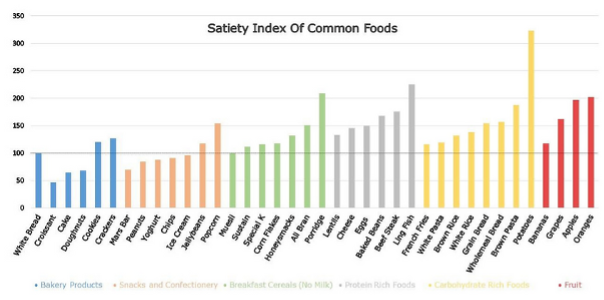
How much should you eat to lose weight sustainably
Remember I said you don’t have to count calories to lose weight sustainably?
Well, you don’t 🙌🏻
But that doesn’t mean calories don’t matter.
Wether you gain or lose weight is decided by calorie balance.
Calories from the food you eat must be burnt or stored.
The simplest way to control your calories and lose weight is through portion control.
If you want to keep fat loss simple, then consider this tactic:
- 1 plate of food at each meal
- 2 snacks that fit in the palm of your hand (ideally a piece of fruit or a portion of protein)
- 3 500ml bottles of water
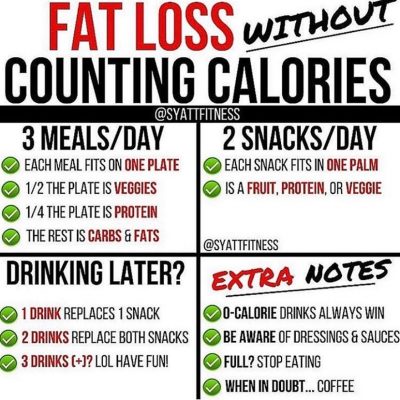
Once you’re eating that way consistently, start to build your plate like this:
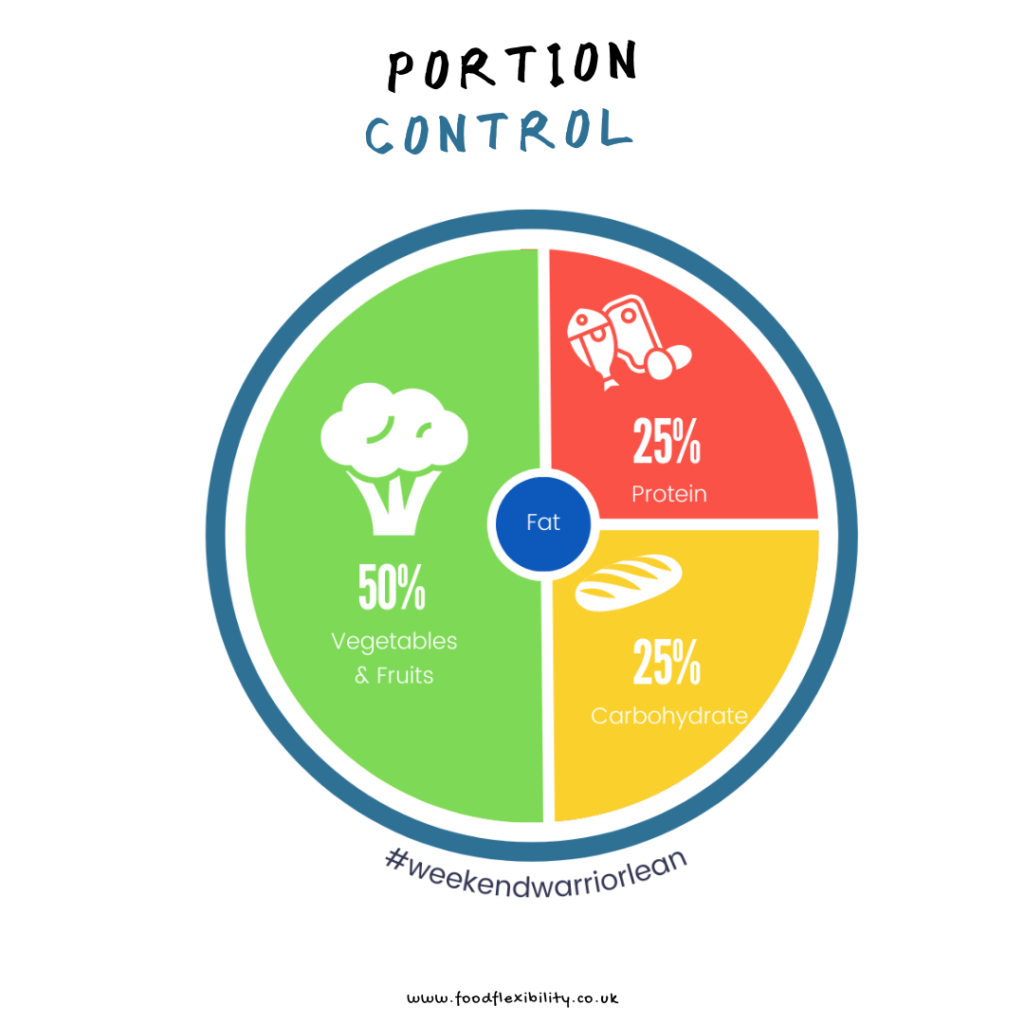
Or like this:
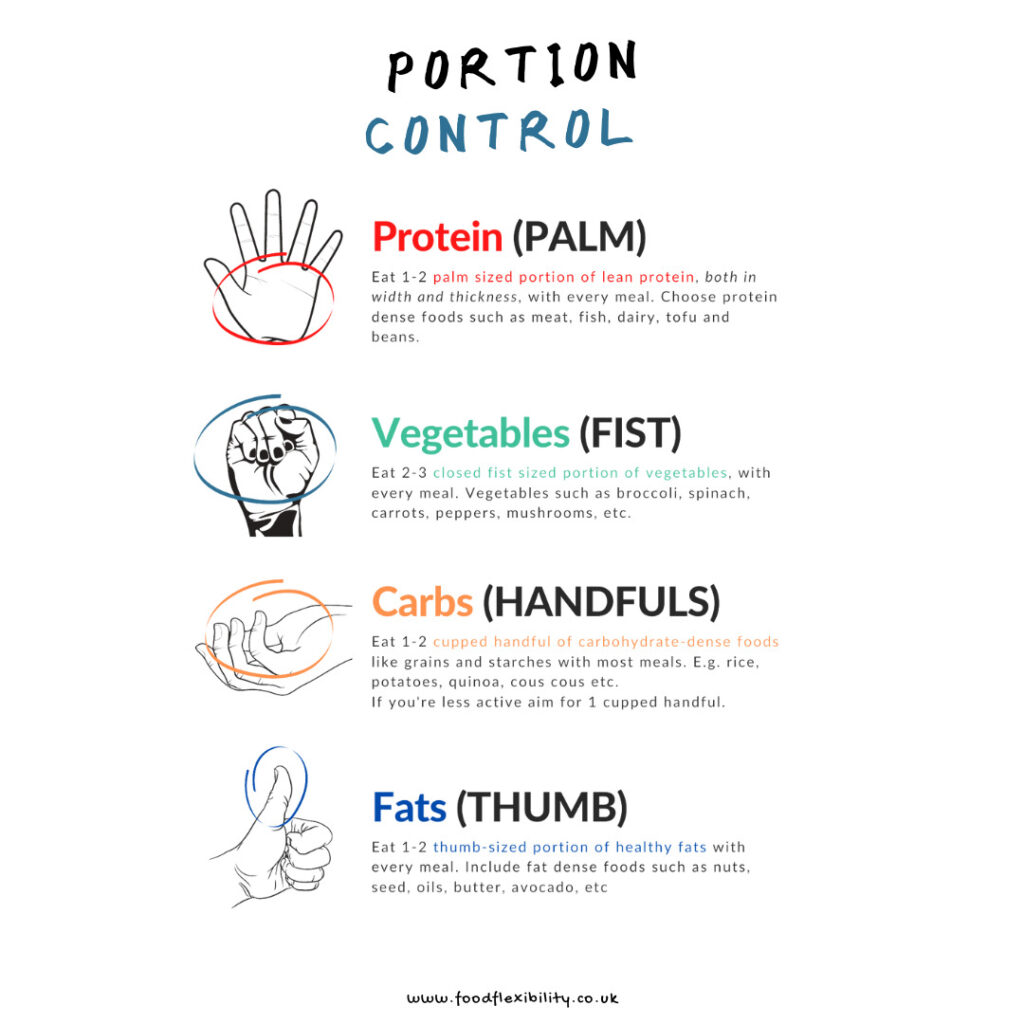
“But Tim, what about things like ice-cream, cake, and booze. You said I could eat those and lose fat.”
You can but you need to adjust the rest of your portions to make sure you’re still in a calorie deficit:
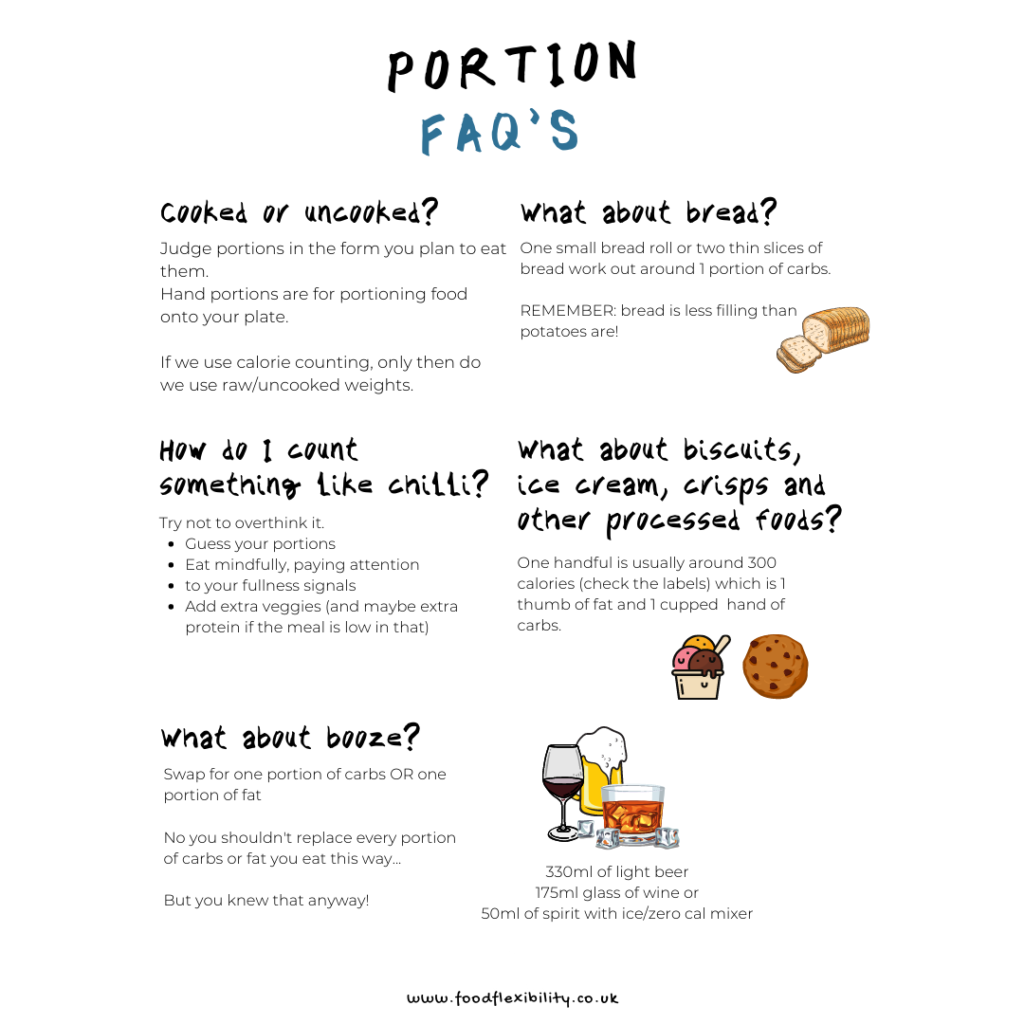
Remember Emily, James, Karen, Nick, Martin & Chris? This is the approach I used with them before we even started talking about calories.
I still use that approach with every one of my online nutrition clients when we first start working together.
It’s a great way to dial in a healthy, balanced meal and lose weight sustainably.
For some of you that’s as far as you’ll ever need to go.
How calorie counting can help you improve your relationship with food and lose weight sustainably
Because most of you like a few of the finer things in life.
Chocolate, booze, ice cream, crisps, cake etc.
You might think you have to cut out those things because they don’t fit into neat little brackets.
Maybe you heard that calorie tracking helps you lose weight but dismissed it as being too restrictive.
Here’s the thing.
If you feel guilty for eating two mini cupcakes because you consider them ‘fattening’ what does that say about your relationship with food?
Would you say you’d ruined your diet by eating two bananas, or a large chicken breast?
Of course not.
What if I told you that those two mini cupcakes are 100 calories each:
- the same as one banana
- the same as half that large chicken breast
Are the cupcakes less nutritious?
Of course!
But if the two cupcakes don’t take you beyond your calorie target for the day you can eat them and still lose fat.
By the way, if someone is insisting sugar makes you fat because it ‘spikes your insulin’, get them to read this.
Understanding the calories in your food is about freedom, not restriction.
Don’t be afraid to try something new in the pursuit of weight loss:
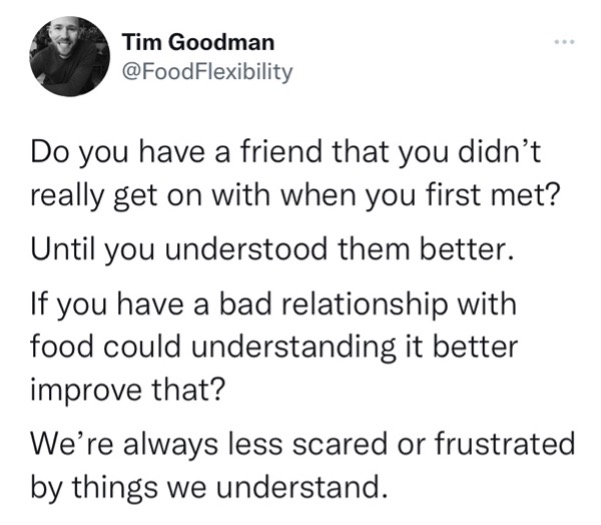
You might find calorie tracking it’s a game changer.
Nick certainly did:
“But Tim, I just think that calorie counting will be a pain in the ass”
It’s unfortunate but the process of learning anything new sucks until you get the hang of it.
Provided you’re willing to give it a crack, calorie tracking doesn’t take too long to pick up and becomes intuitive quickly.
That’s not to say that the first time to you try to track the calories in a Chinese takeaway with the in-laws isn’t going to be a pain in the ass.
It will!
You’ll almost certainly get it wrong but like anything new, keep practicing and the habit gets easier.
That’s exactly what happened for my client Clair, a busy mum who works out 5 days per week, has an active job, eats healthily but didn’t feel she looked the way she should given the effort she puts into the gym.
She always felt that calories and macronutrients were way too complicated, so I navigated her through the advice in this article and boom:
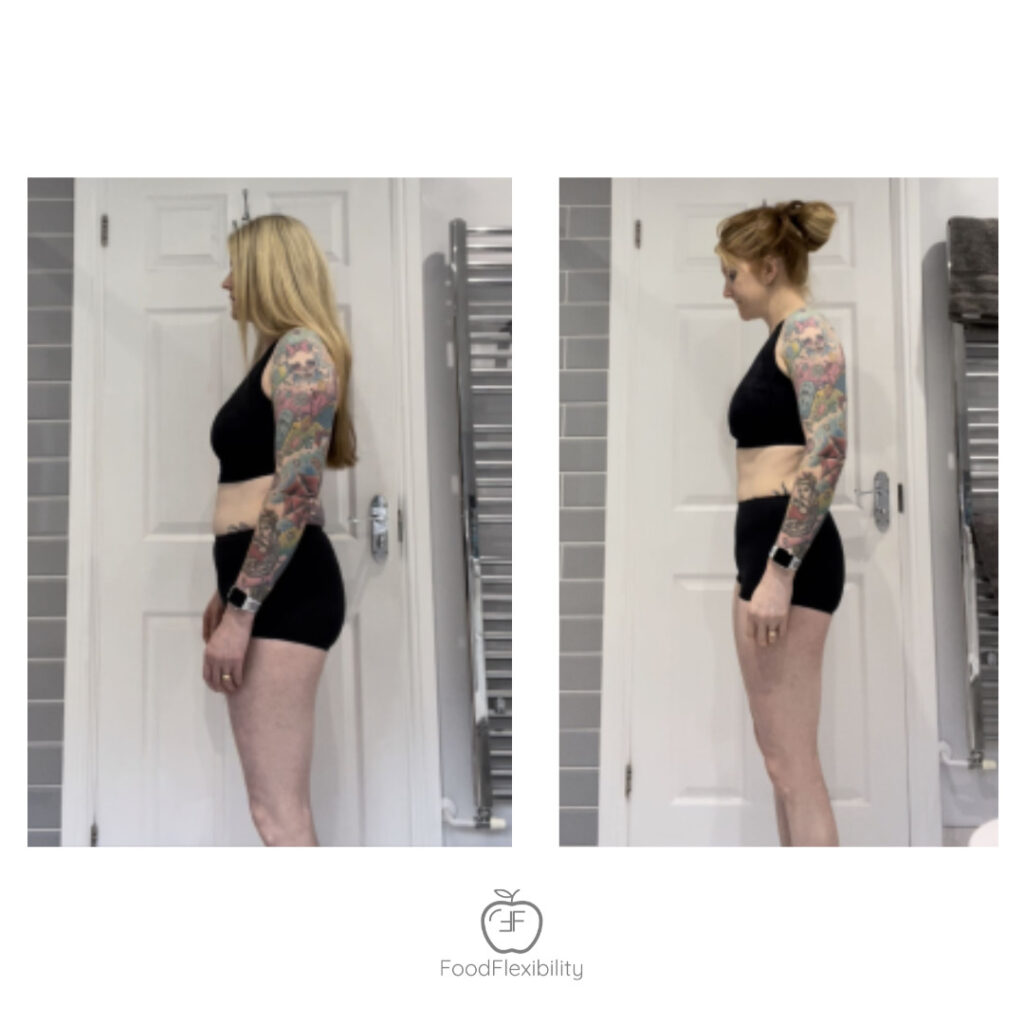
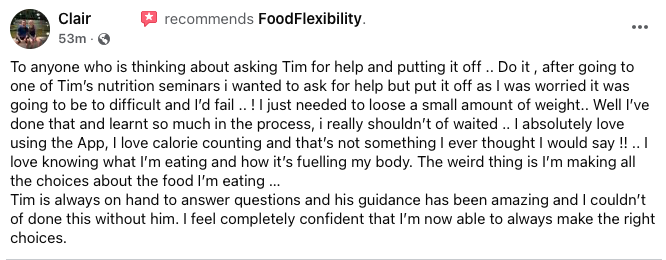
Remember your reason for losing weight?
Surely, it’s worth the minor inconvenience of tracking that Chinese takeaway for 5 mins rather than scrolling through Instagram for half an hour.
You don’t have to enjoy tracking but discipline breeds freedom.
Imagine being able to look at a table full of food and know how many calories you’ll put on your plate without tracking.
If you practice the skill of calorie tracking, whilst actively learning about food, rather than just scanning barcodes, in a few months you’ll be able to do just that.
Can you lose weight eating your favourite foods?
You’re going to learn how many calories you should eat to lose weight sustainably in a moment but here’s why understanding calories helps you lose fat without giving up your favourite foods.
If you need to eat 1,800 calories per day to lose fat, then there is absolutely no harm in eating 20% of those calories (360 cals) from ‘junkier’ foods.
In fact, I wrote this article explaining why you’re more likely to lose weight sustainably that way.
How many calories should you eat to lose weight sustainably?
Here’s what you’ve been waiting for.
How to calculate your weight loss calorie requirements as simply as possible:
To lose weight sustainably multiply your goal bodyweight (in kg) by 26.
That will give you a calorie target for sustainable weight loss.
There’s a bunch of different ways to calculate that calorie target, but this is the simplest method.
Tips for setting your calorie target to lose weight sustainably
- Pick a sensible goal weight.
- Not what you weighed at 16 years old or how much your favourite celebrity weighs!
- Either pick a weight where you think you’ll be at your leanest or an intermediate goal.
- e.g., if you’re 130kg and your goal is 80kg then you could pick 100kg which is a bit less extreme.
- Going straight to 80kg would give faster weight loss but faster isn’t always sustainable. Choose the option that suits you best.
- Don’t get attached to the scales
- Focus on the habit of tracking your calories before tracking your weight.
- If you hit your calorie target each day the scale looks after itself in the long run.
- You don’t get to control the day-to-day fluctuations on the scales, but you do get to control your focus on calorie tracking. Put your energy into tracking not predicting the future!
If you want more of my best tips for losing fat sustainably, why not sign up to my email newsletter below:
If you sign up using the form above, I’ll calculate your calorie targets for free!
Now you’ve set your calorie target it’s time to look at protein.
How protein helps you lose weight sustainably
Emphasising protein in your diet will help you lose weight sustainably.
Put simply, increasing your intake of meat, fish, tofu, eggs, Greek yogurt, and other high protein foods helps you lose fat, build muscle, increase your strength, and stay full even when you eat fewer calories.
Protein is the badass of the macronutrient world because:
1) Protein preserves muscle and metabolism
Your body can’t make its own protein so if you don’t eat enough when in a calorie deficit then your muscle can get broken down for energy.
This is where a lot of slimming clubs go wrong. If you’re eating less calories, you need a high protein intake to preserve muscle.
‘Crashing your metabolism’ when dieting isn’t really a thing on a high protein diet but if you’re low calorie and low protein you risk losing valuable muscle.
That’s because if you don’t eat plenty of protein in a calorie deficit your body can start to break down muscle for fuel in addition to fat.
You won’t loose all your muscle but your metabolism will reduce over time because muscle helps you burn more energy at rest and move around more.
2) Protein is filling
If you can feel fuller eating fewer calories, weight loss will be easier.
Research consistently shows that high protein diets aid fat loss[1] [2].
3) Digesting protein burns more calories
It takes more energy for your body to break down protein than it does carbohydrates and fats.
This does depend on the food but if you really want to ‘boost your metabolism’ then get your protein in.
How much protein should you eat each day for sustainable fat loss?
Take your goal bodyweight in kilograms and multiply it by 2.2.
Split that amount evenly across your meals. It doesn’t have to be the same at every meal but try to get at least 20-25g per meal (a palm sized serving).
So, if you want to be 80kg then your protein target is 180g* per day and if you eat 3 meals and 2 snacks that’s 35g each time you eat.
*This isn’t 180g of chicken breast or tofu this is the protein number in your calorie tracker or product label
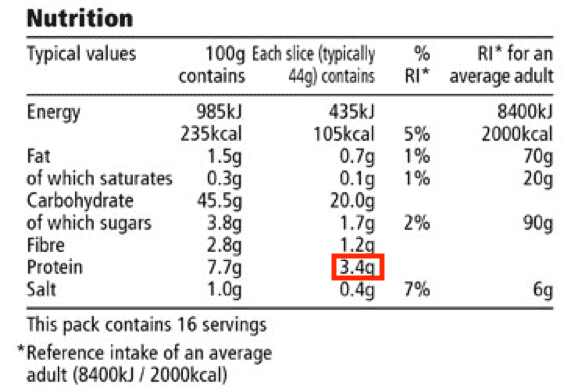
If 2.2g per kg seems a lot, start at 1.4g and look to increase each week.
You might find it’s a game changer:
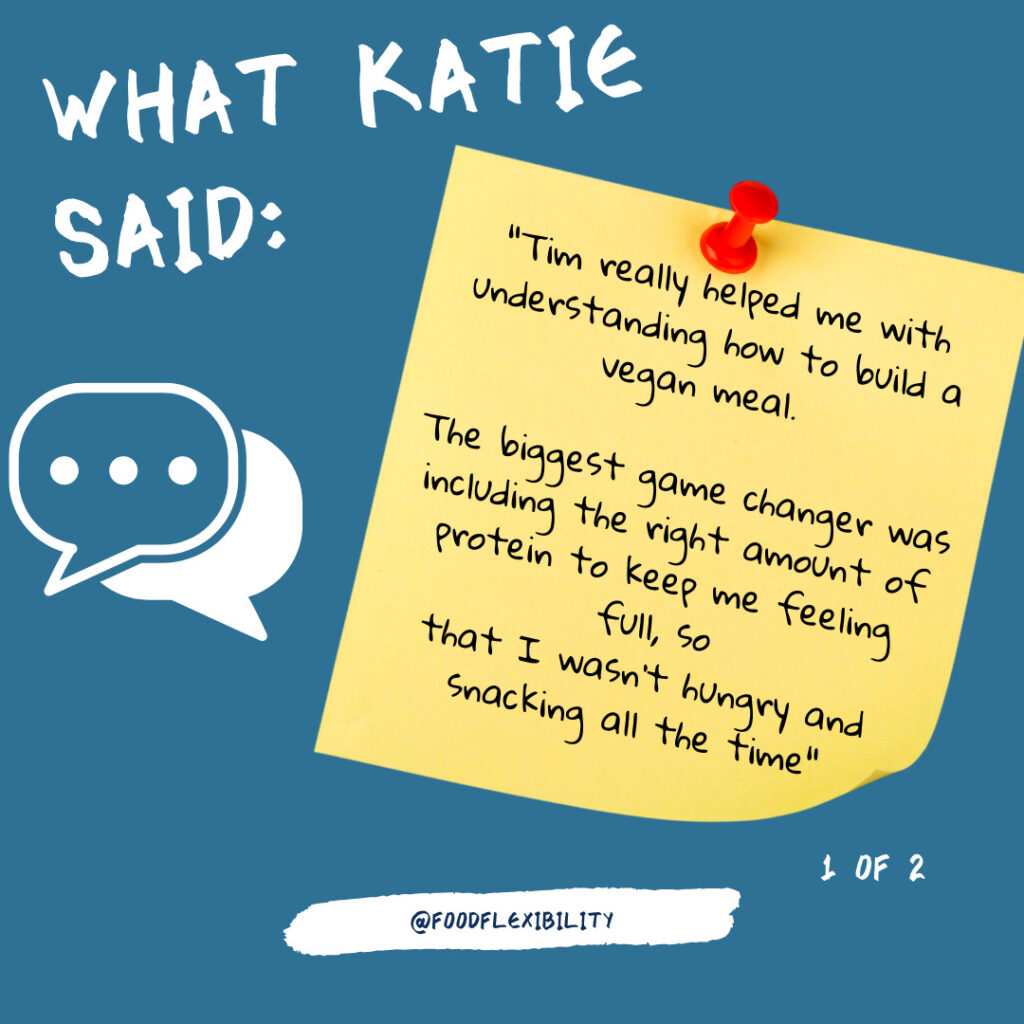
What is the ideal carbohydrate and fat ratio for fat loss?
Simplicity is the key for fat loss.
Most of you do not need to worry about the amount of fat and carbohydrate in your diet.
Focus on hitting your calorie and protein targets in that order of preference and, provided you aren’t eating sticks of butter, everything will look after itself.
Does eating fat make you fat?
Fat that you eat does not necessarily get stored as bodyfat.
At the risk of sounding like a stuck record, the only way to store bodyfat is to eat too many calories.
Dietary fat (the fat in your food) is essential for health and regulating your hormones.
Don’t eliminate fat from your diet. You need it to survive!
Do carbohydrates make you gain weight?
Carbohydrates do not make you fat!
There is an overwhelming amount of evidence showing that calories, not carbohydrates, dictate fat loss and fat gain [3].
Carbohydrates are incredibly important to your overall health:
- They are the number one fuel for exercise.
- They taste amazing and often lift your mood.
- They give you fibre which is essential for proper digestion and keeps you feeling fuller for longer.
Don’t listen to people who try to confuse you by talking about carbs causing ‘spikes in insulin’ either.
It’s all about calories.
You can read my article about why insulin causes fat storage but doesn’t make you fat here.
So, please eat potatoes, pasta, bread, rice, and fruit.
Provided they fit into your fat loss calorie target, you will lose weight.
Note:When you eat carbohydrates, they ‘suck in’ water. This causes temporary changes in your weight (because water is heavier than air) but this is ‘fake weight’ not bodyfat.
Your friend that did Keto and lost 5lbs in the first week?
That’s water weight not fat.
I’ll leave it to you to let them down gently as they stir butter into their coffee whilst you spread it on a nice warm slice of toast.
What is the best way to track calories for sustainable weight loss
Now you know what targets to aim for, I suggest tracking your calories in the MyNetDiary app.
It’s free to use, advert free and has a verified database meaning you can trust most of the entries.
The app is intuitive and there’s visual portion guides to help you track calories without weighing.
You also get to customise the dashboard so you can set it up to focus on just calories and protein. That way you’re not going to be overwhelmed by too much information.
If you’re nervous about tracking, just enter the foods you eat and don’t worry about your calorie target to begin with.
This takes the pressure off to ‘get it right’ strait away.
Remember my clients Clair & Nick from earlier in this article?
Take a leaf out of their book.
Be curious about your food and use tracking as an opportunity to learn!
You’ll probably find that by simply being aware of calories they will reduce without you even realising.
Some things that help my clients track calories for weight loss when they first start:
- Enter your meals in your calorie tracking app at the start of the day or the evening before. Being prepared saves you from scrambling around trying to figure out what to eat later in the day!
- If there is something you really want to eat for the day (like a burger with your friends in the pub). Log that first then build the rest of your meals around it.
- You don’t have to eat whole portions of things. For example, if you only have enough calories remaining in your ‘budget’ for half a sausage roll, eat half and save the rest.
- If you’re planning to head out for dinner, look at the menu ahead of time and plan the rest of your day around that meal.
- If you go over your targets, then adjust the following few days (because the weekly average matters most).
- Weigh everything you can, measuring cups and spoons are not accurate.
- Weigh in the raw or uncooked state. It’s more consistent that way.
- Don’t bother tracking non-starchy vegetables. They don’t add that many calories and by eating plenty of them you’ll be fuller and more energised which makes sticking to your targets easier.
- Don’t allow your calorie app to adjust for calories burned from exercise. It seems like an awesome idea but just doesn’t work in the long run.
This article explains how to keep calorie tracking as simple as possible.
Will you gain weight if you go over your calorie target?
It’s practically impossible to gain body fat in a single day of overeating.
Yes, even when you plough through 10,000 calories of turkey, mice pies, brandy cream and port on Christmas day!
When you eat differently to normal your weight will change due to water retention and undigested food in your system.
It’s temporary and will pass after a few days of normal eating.
When it comes to fat gain, it’s the weekly, fortnightly (or even monthly) calorie total that matters most.
Thinking of calories like a bank balance can help.
If you need 2,000 calories per day to lose weight that’s 14,000 for the week.
If you eat 3,000 on a Sunday, then you’d need to eat 1,800 for the other 6 days to even things out.
Remember, just like a bank balance you can spend it all on pay day, but you’re going to be scratching around by the end of the month if you do!
Having some flexibility around the meals you eat helps you be consistent because you can enjoy a Sunday roast or a few beers on the weekend and then just eat lighter for the rest of the week to ‘compensate.’
This is because it’s really the monthly average that matters
Nobody is going to be able to figure that monthly average out so going for a weekly average is a nice compromise.
Thinking of the average calories across the week helps you lose weight sustainably because it gives you flexibility!
The Ultimate Weight Loss Hack
Here’s what you’ve been waiting for…
The one little ‘hack’ that will make this whole process easier.
Planning and organisation are the ultimate weight loss hacks!
Pretty underwhelming right?
Well, this stuff isn’t half as sexy as all the ‘influencers’ out there would con you into thinking.
‘Influencers’ are making a ton of dirty money from promoting eye catching ‘hacks’ on social media (cough* Liver King) because quick fixes are easy to market.
Don’t assume that because people you see on social media, or even in the gym, look a certain way that you will too.
‘Influencers’ usually forget to mention their above average genetics and the image enhancing drugs they’ve been taking.
Assuming you don’t want to take image enhancing drugs (and btw you’ll still need to dial in your diet if you do) then the boring act of simply being more organised is the place to focus your attention.
You may have always struggled with moderating your food intake. That’s often because you’re going into situations blind.
If you’re hungry, when you open the fridge, or a menu, you’ll be presented with too many options to make a rational choice.
The reason you pick a leftover slice of cheesecake or a bacon cheeseburger in that situation (which you could fit into your weekly calorie allowance btw) is not lack of willpower its lack of planning.
Humans like simplicity and clarity. You freak out without them.
Fads like Keto and ‘clean eating’ help in the short term because they give people clarity.
Simple rules that limit food choices.
A better way to make ‘rules’ for sustainable fat loss:
No doubt you have favourite meals that you eat all the time.
All my online weight loss clients start by figuring out three ‘go to meals’ for breakfast, lunch, and dinner (one of them a meal out).
They figure out the calories and protein in each and simply remember that (more on that in a moment).
They then increase this list over time.
This way, their ‘rule’ is they know what meals match their goal in any situation.
13 simple steps to lose weight sustainably
Eating at home:
1. Come up with three ‘go-to meals’ using the guidance in this article on how to set up your diet for fat loss.
2. Look up the calories and protein and add to a list in your phone for future reference.
3. If you need some recipe inspiration, head over to the BBC Good Food website and look for some high protein recipes.
4. Use those go-to meals to produce a menu for the week.
5. Buy your groceries using that menu.
6. Put the menu on the fridge. Like this one
7. If you see a new recipe for a meal you like, adjust the portions according to your targets and add it to your ‘go to’ meals.
Eating out:
Here’s a few strategies that work well for my clients:
8. Option 1 – Look at the menu beforehand and log what you’re likely to eat in your calorie app. You can then see how it fits your goal and adjust today or tomorrow as necessary.
9. Option 2 – Apply a broad rule of thumb to eating out:
- Most starters are going to be 500-800 calories.
- Most mains are going to be 700-1500 calories.
- Most deserts are going to be at least 600 calories.
10. Option 3 – Don’t track at all but build your daily eating around this pattern:
- 1 plate at each meal (that means all your food for that meal fits onto a single plate – no seconds).
- 2 snacks that fit in the palm of your hand (ideally a piece of fruit or a portion of protein).
- 3 500ml bottles of water.
Tips:
11. You don’t need to stick to one option, feel free to mix them up.
12. If you’re hungry, grab a protein shake before you go out for food, you’re less likely to overeat due to hunger this way.
13. If you want to drink alcohol, switch one snack for one drink. If you feel it’s worth drinking more than 2 drinks, crack on and enjoy the occasion and get back to your nutrition the following day.
Remember it’s the chef’s job is to make your food delicious with lashings of butter, cream, and oil, so restaurant meals have more calories than the ones you cook at home.
Sustainable Weight Loss FAQ’s
Thanks for reading the ultimate guide to losing weight sustainably without giving up your favourite foods
Now you know how to lose weight sustainably by eating the foods you love and improve your relationship with food in the process.
Have you got a question I didn’t answer?
If so, post it in the comments below and I’ll give you an easy to digest answer (pun intended).
I’d love to help!
Or, if you know a friend this article would benefit, please share it with them using the links below.
Thanks for reading!
ps. Thanks to all of my amazing clients for sharing their journeys with you.
Their discipline and patience made the progress you see possible.
I’d also like to give a huge shout out to Jordan Syatt for encouraging me to write this article. I was inspired by the incredible book Eat It (written by Jordan and his colleague Mike Vacanti).
You can find it on Amazon here.*
*Not an affiliate link I just love the book!

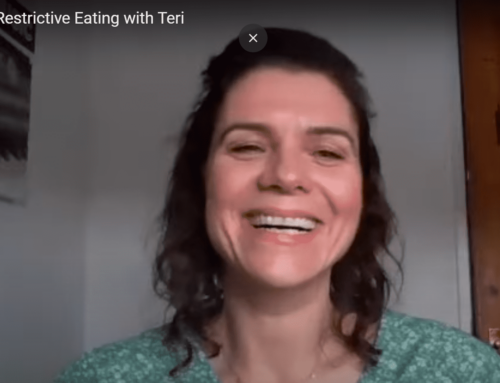

Comments are closed.